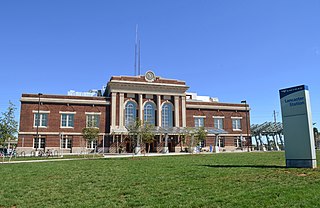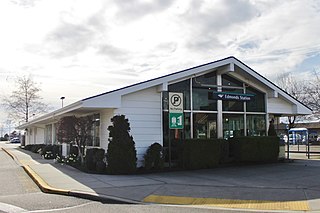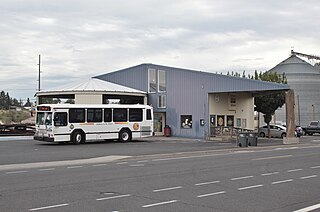
King Street Station is a train station in Seattle, Washington, United States. It is served by Amtrak's Cascades, Coast Starlight, and Empire Builder, as well as Sounder commuter trains run by Sound Transit. The station also anchors a major transit hub, which includes Link light rail at International District/Chinatown station and Seattle Streetcar service. It is located at the south end of Downtown Seattle in the Pioneer Square neighborhood, near the intersection of South Jackson Street and 4th Avenue South, and has four major entrances. It is the 15th-busiest station on the Amtrak system, serving as the hub for the Pacific Northwest region.

Saint Paul Union Depot is a historic railroad station and intermodal transit hub in the Lowertown neighborhood of Saint Paul, Minnesota. It serves light rail, intercity rail, intercity bus, and local bus services.

Springfield Union Station is a train and bus station in the Metro Center area of Springfield, Massachusetts. Constructed in 1926, Springfield Union Station is the fifth-busiest Amtrak station in the Commonwealth, and the busiest outside of Greater Boston.

Richmond station is an Amtrak intercity rail and Bay Area Rapid Transit (BART) station located in downtown Richmond, California. Richmond is the north terminus of BART service on the Orange Line and Red Line; it is a stop for Amtrak's Capitol Corridor, San Joaquins, and California Zephyr routes. The accessible station has one island platform for the two BART tracks, with a second island platform serving two of the three tracks of the Union Pacific Railroad Martinez Subdivision for Amtrak trains. It is one of two transfer points between BART and Amtrak, along with Oakland Coliseum station.

The Kelso Multimodal Transportation Center is an Amtrak train station located near downtown Kelso, Washington, United States. The station also serves the neighboring city of Longview, which is located just across the Cowlitz River. The station is served by Cascades and Coast Starlight trains. Greyhound Lines provides national and regional bus service, while RiverCities Transit provides local transit. Shuttle vans, taxis and rental cars can also be hired at the station.

Pacific Central Station is a railway station in Vancouver, British Columbia, Canada, which acts as the western terminus of Via Rail's cross-country The Canadian service to Toronto and the northern terminus of Amtrak's Cascades service to Seattle and Portland. The station is also Vancouver's main intercity bus terminal. The station is wheelchair accessible and is staffed with full Via services. The station is a candidate for the northern terminus of a possible future high-speed rail line being considered primarily by the US state of Washington.

The Alvarado Transportation Center (ATC) is a multimodal transit hub located at 100 1st Street SW in Downtown Albuquerque, New Mexico. The complex was built as a hub for Albuquerque's regional transit system and as a replacement for Albuquerque's previous bus depot and train station. The center serves ABQ RIDE, Amtrak, Greyhound Lines, and the New Mexico Rail Runner Express commuter rail line.

Everett Station is an Amtrak train station serving the city of Everett, Washington, United States. The station has provided service to the Cascades and Empire Builder routes since its opening in 2002, replacing an earlier station near the Port of Everett. The four-story building also houses social service programs and is the center of a 10-acre (4 ha) complex that includes parking lots and a large bus station used primarily by Community Transit, Everett Transit, and Sound Transit Express. The station has served as the northern terminus of the Sounder N Line since 2003 and the Swift Blue Line since 2009. It consists of two side platforms, one serving Amtrak and the other serving Sounder commuter trains. Everett Station also functions as a park and ride, with 1,067 short-term parking spaces located in lots around the station after it was expanded by Sound Transit in 2009.

Lancaster station is an Amtrak railroad station and a former Pennsylvania Railroad station in Lancaster, Lancaster County in the U.S. state of Pennsylvania. Located on the Keystone Corridor, the station is served by the Keystone Service between New York City and Harrisburg, and by the Pennsylvanian between New York and Pittsburgh. Lancaster is the second busiest Amtrak station in Pennsylvania, and the twenty-first busiest in the United States. It is one of the busiest Amtrak stations serving a metropolitan area smaller than two million people, primarily because of the large number of passengers traveling to and from Philadelphia and points east.

Sacramento Valley Station is an Amtrak railway station in the city of Sacramento, California, at 401 I Street on the corner of Fifth Street, built in 1926 on the site of China Slough. It is the thirteenth busiest Amtrak station in the country, and the second busiest in the Western United States. It is served by four different Amtrak train routes and connecting Amtrak Thruway motorcoaches. It is also the western terminus for the Gold Line of the Sacramento RT Light Rail system and the Route 30 bus serving California State University, Sacramento.

The Fullerton Transportation Center is a passenger rail and bus station located in Fullerton, California, United States.

Martinez station is an Amtrak passenger train station in Martinez, California, United States. Located at the west end of downtown Martinez, the station has one side platform and one island platform, which serve three of the four tracks of the Union Pacific Railroad Martinez Subdivision. It is served by the daily California Zephyr and Coast Starlight long-distance trains, five daily round trips of the San Joaquin corridor service, and fifteen daily round trips of the Capitol Corridor service. Martinez is also served by Amtrak Thruway buses plus County Connection, Tri-Delta Transit, and WestCAT local buses.

Edmonds station is a train station serving the city of Edmonds, Washington, in the United States. The station is served by Amtrak's Cascades and Empire Builder routes, as well as Sound Transit's N Line, a Sounder commuter rail service which runs between Everett and Seattle. It is located west of Downtown Edmonds adjacent to the city's ferry terminal, served by the Edmonds–Kingston ferry, and a Community Transit bus station. Edmonds station has a passenger waiting room and a single platform.

Ephrata is a train station on Amtrak's Empire Builder line in Ephrata, Washington. The station and parking are owned by the city government, while the track and platforms are owned by BNSF Railway. Northwestern Trailways provides inter-city bus transportation next to the station while local transit is provided by the Grant Transit Authority.

The Centennial Station is a train station located immediately south of Lacey, Washington, United States, that also serves the capital city of Olympia. The station is served by Amtrak's Cascades and Coast Starlight.

Auburn station is a train station in the city of Auburn, Washington, United States, served by S Line of the Sounder commuter rail network. It is located southwest of downtown Auburn and consists of two train platforms, a bus station, a parking garage, a public plaza, and a pedestrian bridge. The station has 633 parking spaces and is also served by Sound Transit Express, King County Metro, and Pierce Transit buses. Auburn station opened in 2000 and was built on the site of a former railroad station that was demolished in 1979. The parking garage and pedestrian bridge opened in 2003, and a second parking garage is planned to be built by 2027.

Tacoma Dome Station is a train station and transit hub in Tacoma, Washington, United States. It is served by Amtrak trains, the S Line of Sounder commuter rail, the T Line of Link light rail, and buses on local and intercity routes. Located near the Tacoma Dome south of Downtown Tacoma, the station consists of two train platforms used by Sounder and Amtrak trains, a platform for the T Line, a bus terminal, and two parking garages. The Sounder station is integrated into Freighthouse Square, a former Milwaukee Road depot that was converted into a shopping mall, and is on the east side of the Amtrak station.

Stanwood is an Amtrak train station in the city of Stanwood, Washington, United States. It is served by intercity Amtrak Cascades trains and consists of a single platform and an adjacent parking lot. The station is in downtown Stanwood, near the intersection of State Route 532 and the Pioneer Highway, and is also served by Community Transit and Island Transit buses.

Redding station is an intercity train station served by Amtrak's Coast Starlight, located in Redding, California, United States. The depot was built by the Southern Pacific Railroad in 1923 and opened on February 5, 1924. The train station has sheltered waiting areas on both platforms and a parking lot near the southbound platform.

Icicle Station, also known as Leavenworth station, is a train station in Leavenworth, Washington, United States. It is served by two daily Amtrak trains on the Empire Builder, which travels west to Seattle and east to Chicago. The station has one platform and is located northeast of downtown Leavenworth, which is noted for its Bavarian village theme.

























